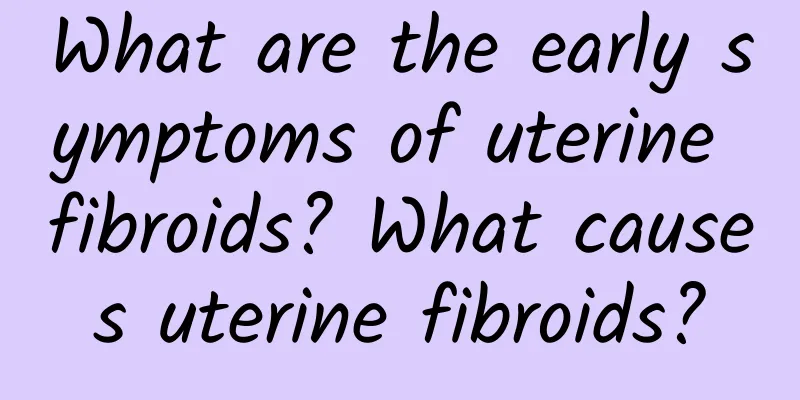What are the early symptoms of uterine fibroids? What causes uterine fibroids?

|
What are the early symptoms of uterine fibroids? What causes uterine fibroids? Uterine fibroids are a common gynecological disease caused by abnormal growth of smooth muscle tissue in the uterine wall. Uterine fibroids are often asymptomatic, and many patients only realize they have the disease during a physical examination. However, some patients will experience symptoms in the early stages of uterine fibroid development, which is very important for early diagnosis and treatment. 1. Dysmenorrhea and abnormal menstruation Dysmenorrhea is one of the most common symptoms of premenstrual uterine fibroids. Patients often feel severe abdominal pain during their menstrual period, even accompanied by nausea and vomiting. In addition, some women experience abnormal menstrual flow and cycles during their menstrual period. Their menstruation may become more abundant and prolonged, and they will experience more frequent menstrual cycles. These abnormal menstrual symptoms may indicate the presence of uterine fibroids. 2. Frequent urination and difficulty urinating The growth of uterine fibroids can put pressure on the bladder, causing frequent urination and difficulty urinating. You may feel the urge to urinate frequently but not urinate much, or you may feel discomfort and difficulty urinating. These symptoms may be caused by uterine fibroids. Pelvic pain and pressure As uterine fibroids grow and press on nearby organs, you may experience pelvic pain and pressure. This pain may come and go or be constant. You may feel a sense of heaviness and discomfort in your lower abdomen. If you experience these symptoms, especially if they are accompanied by other discomforts, such as indigestion and difficulty having a bowel movement, consult your doctor. 4. Infertility or miscarriage Uterine fibroids may affect conception and embryo implantation, leading to infertility or multiple miscarriages. Some patients experience spontaneous abortions soon after finding out they are pregnant, which may be caused by uterine fibroids. If a patient has been trying for a while and still has not conceived or has had multiple miscarriages, the possibility of uterine fibroids should be considered. 5. Pressure on the digestive system As uterine fibroids grow, they may compress the digestive system, causing indigestion and constipation. Patients may experience bloating, stomach discomfort, and loss of appetite. These symptoms may affect normal eating and bowel movements, which in turn affects the body's nutrition and health. Summarize: There are many early symptoms of uterine fibroids, including dysmenorrhea and abnormal menstruation, frequent urination and difficulty urinating, pelvic pain and pressure, infertility or miscarriage, and compression of the digestive system. These symptoms may not all appear, and different patients may have different symptoms. If any of the above symptoms occur, especially if multiple symptoms occur at the same time, you should seek medical attention in time for further examination and diagnosis. Early detection and treatment of uterine fibroids can avoid its impact on quality of life and fertility. |
<<: What to eat to eliminate uterine fibroids? What to eat to recover quickly from uterine fibroids?
Recommend
Can I eat bananas after miscarriage? Avoid postpartum anemia and constipation
Eating fruits can replenish the nutrients that th...
What to do if you reach menopause at the age of 40
Menopause in your forties may be a sign of premat...
Brief analysis of the symptoms of different degrees of cervical erosion
According to the different conditions of cervical...
Garlic protects the liver and lowers cholesterol... Do this one trick to eat it to get full anti-cancer power
The protagonist on the dining table is none other...
What are the specific hazards of endometrial tuberculosis?
Gynecological diseases bring great harm to women....
Why do you feel sore in the waist and knees before menstruation?
Most women experience weakness in the waist and k...
What are the dangers of drinking during menstruation? Be alert after reading this
Women's bodies are more fragile during menstr...
Is artificial abortion painful? Will it leave any sequelae?
Is artificial abortion painful? Will it leave any...
What is the principle of using Lipu Knife to treat cervical erosion? Analysis of the pros and cons of using Lipu Knife to treat cervical erosion
Cervical erosion is a common gynecological diseas...
Why do women with cervical erosion bleed? Six things to pay attention to after surgery for cervical erosion
Why does cervical erosion bleed: 1. Combined with...
Does adenomyosis affect pregnancy?
Does adenomyosis affect pregnancy? The short answ...
Don’t eat rice or bread to lose weight ~ The result of “sugar-restricted diet” is myocardial infarction!
People who want to get rid of obesity and lose we...
Can pelvic inflammatory disease cause infertility? How to prevent and treat it in daily life
How to prevent pelvic inflammatory disease? Can p...
What is the cause of functional uterine bleeding and how to treat it
Dysfunctional uterine bleeding is abnormal uterin...
What is cervical erosion? Will cervical erosion affect pregnancy?
Cervical erosion is a very common gynecological d...









